
Tensions are growing as the outcome of Cameroon's recent presidential elections are being decided.
By Dr Marc Lanteigne
Recent presidential elections in Cameroon took place in the shadow of numerous security crises, of extremism and terrorism, a growing separatist movement, a stressed economy and rising frustration with an octogenarian leader seeking a seventh term in office.
Each of these challenges has the potential to derail both the vote and the political future of the West-Central African state. The violence in the lead-up to the vote and the potential for further strife in the country in the election aftermath have received little notice internationally, despite worries of a spill-over effect in adjacent regions on the continent.
The results of the vote are expected within two weeks. While this election may not be as free and fair as many in Cameroon will have hoped, the greater concern may be what comes next, especially if the violence escalates.
Communication breakdown
In the days before the October 7 election, the separatist regions were under a de factolockdown. Earlier his year, the Cameroon government took the extraordinary step of slowing or shutting down internet service in these regions in the hopes of dampening further protests. Many potential voters are now concerned that the security situation, including threats by separatists to attack polling stations in Anglophone regions, is too unstable for them to cast their ballots.
This situation, along with a divided opposition, may further the chances of President Paul Biya, who has led the country for 36 years, of attaining another seven years in office. The President, representing the Cameroon People’s Democratic Movement (CPDM), has been accused of condoning corruption, being disengaged and frequently out of the country. He is also viewed as becoming increasingly out of touch with the population, of which roughly 60 per cent are aged under 25.
The main opposition party, the Social Democratic Front, has attempted to increase the support of younger voters by putting forward Joshua Osih, a businessperson in his late 40s, as its presidential candidate. In total, President Biya is still facing seven challengers for the vote, and a split opposition vote will likely allow him to return to power. In September the European Union announced it would not send independent observers to Cameroon to monitor the elections, adding to concerns about vote rigging.

Dr Marc Lanteigne.
Tensions flare between French and English speakers
Much of the current governance crisis in Cameroon can be traced to worsening relations between the English and French-speaking populations in the country. When Cameroon gained independence from France in 1960, the British territory of Southern Cameroon opted to join the new state a year later, rather than next-door Nigeria. However, by the 1970s the country sought to centralise power and the rights and autonomous status of the English-speaking regions began to be curtailed.
Movements calling for autonomy or even independence of the Anglophone regions have been present for decades, with English speakers making up around 20 per cent of the country’s population of 24 million. However, since 2016 in the wake of protests over a government decree which placed Francophone judges in the English-speaking regions, the divisions have become more pronounced.
Extremist organisations calling for separation, by force if necessary, began to engage in violent actions against the government in 2017, with some groups calling for an independent state of Ambazonia comprising the southwestern English-speaking parts of the country.
The past two years have seen more than 500 civilian and military casualties from the uprising, with at least 300,000 forced from their homes, including over the border into Nigeria, according to a report this month from the International Crisis Group. The Cameroonian government and military have been accused of seeking to violently quell any dissent, including extrajudicial killings.
Muted global response to Cameroon crisis
So far, responses from the major powers have been muted – despite the rising possibility of a full-fledged civil war. Should the conflict widen, there would be serious consequences not only for Nigeria, which has taken in more than 20,000 refugees since the separation crisis began, but also for France, which remains Cameroon’s main European economic partner.
French President Emmanuel Macron has called for peaceful negotiations to end the secession crisis in May. French troops are currently engaged in anti-terrorism operations in some of Cameroon’s neighbours to the north, including Chad and Niger.
China would feel the impact too, having increased trade with Cameroon in rubber and timber as Beijing seeks to include the country as part of its growing Belt and Road trade network in sub-Saharan Africa.
Canada, which has longstanding connections with Cameroon, has also heard calls for a more pronounced response to the crisis, and the United Kingdom has been calling for improved rights for the Anglophone population in Cameroon.
In addition to the separatist threat, militants from the terrorist organisation Boko Haram have threatened the far northern regions of Cameroon, despite recent assurances from President Biya that the group was no longer a security concern. The security threats in both the north and south have also greatly damaged Cameroon’s economy, which is traditionally dependent upon commodities trade, including in coffee and cotton as well as petroleum.
It is unlikely the vote result will mollify local or regional businesses who are worried about the critical security situation.
Dr Marc Lanteigne is a senior lecturer in international politics in the Centre for Defence and Security Studies.